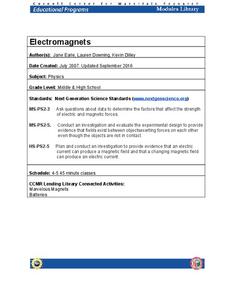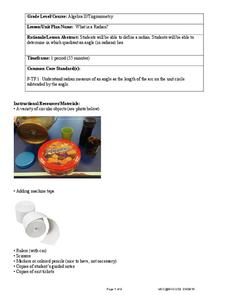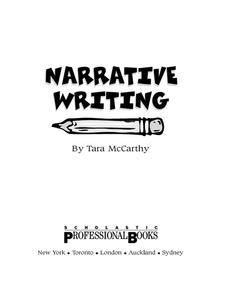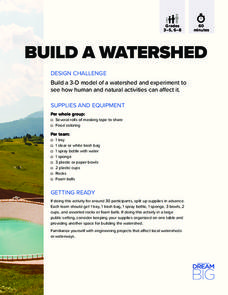NASA
Foam Rocket
When going for distance, does it make a difference at what angle you launch the rocket? Teams of three launch foam rockets, varying the launch angle and determining how far they flew. After conducting the series of flights three times,...
beyondblue
Me, Myself, I: Self-Concept and Self-Esteem
Celebrate the positive qualities of young learners with this collection of self-esteem worksheets. After first listing their interests and personal qualities, learners go on to monitor their self-esteem over the course of...
NASA
Pop! Rockets
Off they go — launching rockets is fun. The lesson plan contains templates to build paper rockets that can be launched from a PVC pipe launcher. Individuals or groups build the rockets and determine the shapes for their fins. Included...
Laboratory for Atmospheric and Space Physics
Charting the Progress of New Horizons
In 2006, New Horizons began its mission to fly to Pluto. As it continues its journey, scholars track its progress with the help of an informative website, all the while reinforcing measurement concepts with the construction of a scaled...
Laboratory for Atmospheric and Space Physics
A Classroom Solar System
Create a scaled model of our solar system in your classroom! Scholars work collaboratively to build paper mache planets and hang them in their proper position to showcase each planet's location in the solar system.
Cornell University
Electromagnets
Discover the connection between electric current and magnets. Scholars create electromagnets by passing a magnet through a coil. They experiment with different materials to determine the variables that affect the strength of the current.
Curated OER
Number Line Snacks: Compare Numbers to 10
Kindergarteners put Cheerios or cheddar fish on two number lines (up to 10 each) and identify which number the snack pieces indicate. They compare numbers after eating a few of each snack, and get an introduction to addition and...
DK Publishing
Addition: Count and Color, part 3
Approach addition with sets of objects to show scholars the operation visually. There are four sets of images here arranged as addends in an addition number sentence. Learners count them and color in the total in a final set. All answers...
Curated OER
Count by Grouping Into Tens
In this counting by grouping worksheet, students group shapes into tens by circling either groups of 5 or ten in ech. A reference website for additional resources is given.
Curated OER
Multiplication as Repeated Addition
For beginners, present multiplication as repeated addition to give them a familiar context. They examine grouped sets of objects and add up the groups to get a total. Then, learners translate the addition sets to a basic multiplication...
Curated OER
Tomato Exploration
Create tomatoes in 15-20 minutes using this fun and interactive lesson plan! Learners listen to a book about tomatoes (recommendations listed), and focus on the vocabulary word tomato. They count the syllables...
Curated OER
Addition Grid
Which of these numbers add up to 20? Scholars find various addend pairs in a grid, circling those that add up to 20. There are many pairs they can find here, and the answer sheet offers some excellent kinesthetic practice ideas for...
Discovery Education
Sonar & Echolocation
A well-designed, comprehensive, and attractive slide show supports direct instruction on how sonar and echolocation work. Contained within the slides are links to interactive websites and instructions for using apps on a mobile device to...
West Contra Costa Unified School District
What Is a Radian?
Here's an algebra II activity that strives to make the concept of a radian less abstract and more conceptual. It takes a hands-on approach to exploring the idea of a radian and allows individuals to develop a definition of a...
Scholastic
Narrative Writing
If you're looking to start a unit based around narrative writing, make sure to consider this resource while you're planning. This book covers five topics: writing personal narratives, writing narratives about others, writing...
DiscoverE
Build a Watershed
What's the best way to learn how watersheds work? Build one! Combining engineering, the water cycle, and ecology concerns, the activity is the perfect fit for an interdisciplinary unit. Teams construct a model watershed with simple...
Curated OER
Finding Volume
Sixth graders develop a rule for finding the volume of rectangular solids using colored cubes. They investigate the properties of solid figures and find the volume of an object by counting units. Students fill spaces with standard-sized...
Illustrative Mathematics
Tossing Cylinders
Everyone loves a lesson that involves throwing things around! To understand probability, your experimenters will predict how different cylinder-shaped objects will land when tossed. When the data is collected, they will calculate the...
Huntington Library
Further Exploration - Exploring the California Missions
How did Native Californians and Franciscans influence one another in early California? Learners analyze a few cultural pieces to examine the impact that integration had on Franciscan and Native Californian culture.
Curated OER
Can You Afford to Retire?
Students participate in a game in which one group acts as the company and the other group acts as the employees. They examine what happens when the company files for bankruptcy. They discover labor strategies as well.
Curated OER
Sorting Living and Nonliving Objects
Third graders sort and classify objects. In this sorting lesson, 3rd graders sort small objects such as cereal or candy. Then, students classify and sort objects that are living or nonliving.
Curated OER
Memories to Last: Observing Monuments
Students use scientific observation and inference to examine the Hazen Brigade Monument. In this observation lesson plan, students review the reasons for building monuments in society. Students then recall monuments they have seen...
Curated OER
Group Triangles Into Fives Or Tens
In this grouping into fives and tens activity, 2nd graders group pictures of triangles by drawing circles around sets of ten. They work with 50 pictures of small, right triangles.
Sargent Art
Kandinsky - Inspired by Music
Who is Wassily Kandinsky? Introduce your young artists to the wonders of abstract nonobjective art through music. They'll listen to music as they cut, paste, and paint emotional works of art. The activity suggests the use of soothing...

























